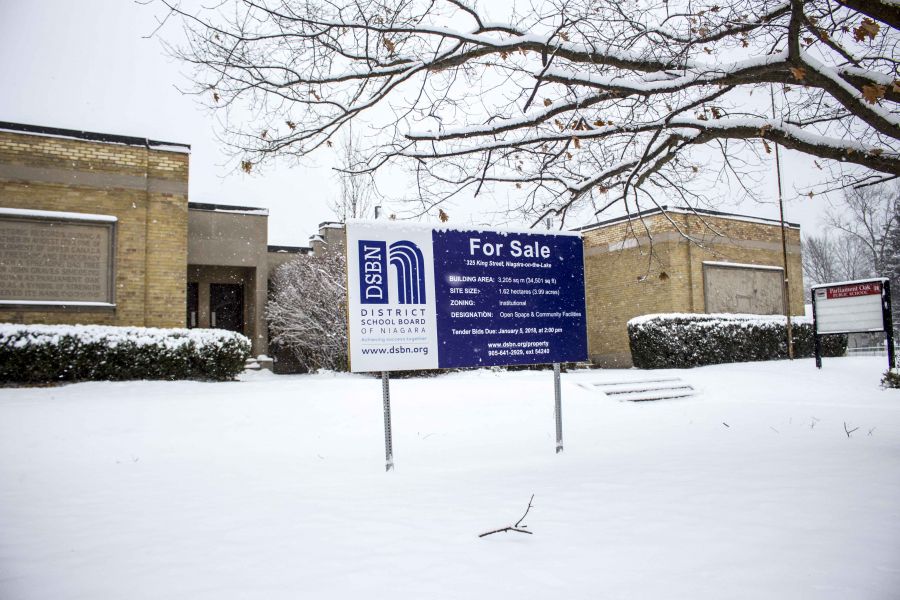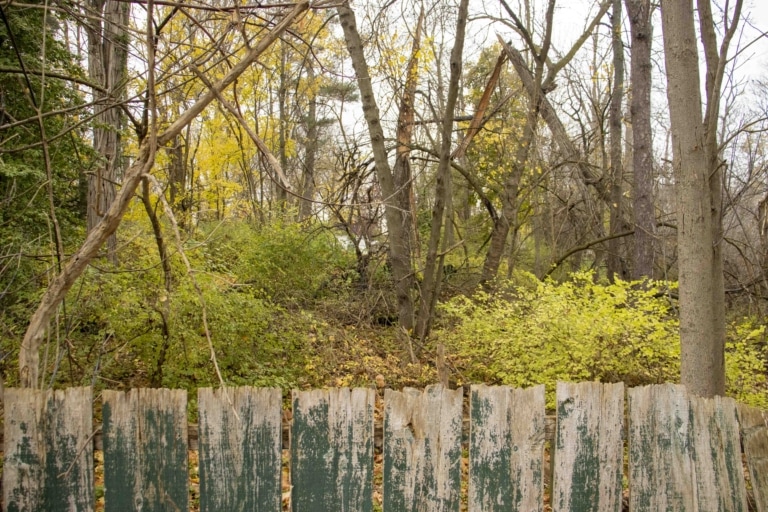Locals in the town of Niagara-on-the-Lake aren’t happy about the uncertain future of Parliament Oak, a site of historical significance for Niagara and the country, where it is believed one of the first documents of the parliament of Upper Canada was signed.
Many townsfolk are accusing the District School Board of Niagara — which owns the property — of purposefully sabotaging the town’s efforts to turn the former school into a community hub so it stays in the hands of the community.
In November, the DSBN rejected an unconditional full-price offer from the town to buy the property.
One day later, the school board issued public tender documents for the sale of the Parliament Oak lands and installed “for sale” signs on the property.
The situation hasn’t sat well with locals like Thomas Elltoft, who grew up in Niagara-on-the-Lake and attended Parliament Oak from kindergarten to grade eight.
He, like many, doesn’t want to see the school fall into the hands of developers.
Elltoft, a realtor with Niagara-on-the-Lake Realty, was a member of the CARE (Citizens for Accountable and Responsible Education) committee, which tried to defend the school from closing in 2014.
He said seeing the school on the public market is a disappointing situation — one that has a foul air to it.
“I think it’s always disappointing when two groups can’t work together for the best decision, rather than it being some long-term argument between the community and school board,” said Elltoft.
“It doesn’t serve the public interest in any format.”
He thinks the future of the school should be up to the community, not in the hands of the DSBN.
“It should have absolutely nothing to do with a school board that has decided this isn’t a location for one of their schools anymore,” said Elltoft.
He points out that the property was gifted to the town in the early 1940s, for the purpose of education, by a lady who owned a farm house there. The property was then gifted to the Town of Niagara School Board in 1945 and gifted again in 1966 to the Niagara School Board.
He said there is no record of when the school became property of the DSBN, and though title searches on Impact or GeoWarehouse (realty tools that tell the history of properties) show the DSBN owns the property now, it “doesn’t say how that transpired.”
He also notes that every prior exchange was made for just $1.
“And when, you know, your town gives a school board a building and a school for them to maintain for you and harbour and house your students, and then now they’re wanting $5 million for it — and even when the town came up to $5 million, they wanted them to guarantee that it would only be used in a certain format — it’s pretty ridiculous.”
In March of 2015, the DSBN sold the 26-acre property of Royal Elite Academy, formerly Niagara District Secondary School, to the town for $1.67 million.
The Parliament Oak property is just under four acres.
Elltoft said the price tag the DSBN came up with for the Parliament Oak property makes him question the motives of the board.
David Israelson, an attorney who moved to NOTL in 2008, is another frustrated resident who doesn’t want to see the school turn into condo development. He’s a member of a group called the Niagara-on-the-Lake Community Hub Organizing Group (CHOG), which has been formed to try and prevent the sale of Parliament Oak school.
Israelson said putting the property up to the highest bidder is not in the interest of the town, and furthermore goes against the direction the Ontario government said it should take regarding school closures and the formation of community hubs with surplus space.
“The first issue is that I think that property is extremely valuable to the community … What concerns me, and I think it concerns other people in the group and in the town, is that the school board seems determined to not let the community have access to that the way they ought to — in a way that’s consistent with provincial goals and what’s good for the community.”
He said nothing surprises him anymore.
“They’ve (the school board) shown time and again that they’re not willing to negotiate in good faith with the community, with the town and I think even with the province.”
CHOG sent a letter to Premier Kathleen Wynne and several cabinet ministers on Dec. 6, outlining the view of the committee, which is that the DSBN is deliberately trying to prevent the town of NOTL from purchasing the property and developing a community hub.
Some of the points to support this reasoning, included in the letter, were that the DSBN imposed three conditions in any purchase agreement with the town, one being that the site and building could never be used as an independent school.
The DSBN insisted these conditions were advised by the provincial government, however the Minister of Education has written to the DSBN to confirm such conditions were never required or requested by the province.
Furthermore, the DSBN’s public tender documents make no mention of these conditions now.
The school board also rejected an offer by the Minister of Education to appoint an independent facilitator to negotiate an agreement between the DSBN and the town.
Lastly, the school board claims that the tender process does not permit the DSBN to negotiate with the town once commenced.
CHOG claims there is “clear and unequivocal language contained in the tender document to support the contrary.”
“The only conclusion to be drawn from the DSBN’s actions is a deliberate attempt to prevent the residents of Niagara-on-the-Lake from realizing the creation of a community hub. Further, we see DSBN’s actions as an attempt to usurp the town’s legitimate jurisdiction over land use. Under the DSBN’s terms the property could easily be sold to a developer who will seek to construct a project that runs counter to the wishes of the Town, the neighbourhood and the community. Such actions will also prevent, in perpetuity, any option of a future use of the site for public education,” the letter to Wynne from CHOG states.
It continues: “DSBN appears to be negotiating in bad faith. Efforts to negotiate fairly with DSBN have been and continue to be rebuffed. We as residents of Niagara-on-the-Lake are seeking your immediate leadership to intervene in this process and reverse the actions taken by the DSBN. To this end the public tender process must be halted immediately to avoid exposure to proposed bidders incurring costs relying on it.
“Time is of essence. Anger is rising and there is increasing disenchantment in Niagara-on-the-Lake with school board policies that do not represent the stated interests of residents and our elected civic representatives.
“Please make no mistake: our group’s commitment to do all necessary to keep this property in public use has been demonstrated in the past and the political implications are evidenced by the full-throated support from the Town. We are sharing our concerns with the public and the media.”
Israelson said he thinks the province should assume some of the responsibility in the decision and that it would be prudent to prepare for a future where a public school might be once again needed.
“The longer term issue is Ontario, I think, needs what’s called a small school strategy. Student population goes up and down … It probably doesn’t really affect this now because Parliament Oak school is closed but someday there might be a really great need for an elementary school in the old town of Niagara-on-the-Lake, and we need to make provisions for that,” said Israelson.
“That’s what keeps a community alive and vibrant, if you have a strategy for keeping things viable and open for different times … I don’t see that sort of forward thinking, certainly not at the school board level.”
This story has been edited to remove a conversation taken out of context.











